- Home
- Tom Stoppard
The Coast of Utopia: Voyage, Shipwreck, Salvage
The Coast of Utopia: Voyage, Shipwreck, Salvage Read online
Shipwreck
THE COAST OF UTOPIA PART II
Tom Stoppard’s other work includes Enter a Free Man, Rosencrantz and Guildenstern Are Dead, The Real Inspector Hound, Jumpers, Travesties, Night and Day, Every Good Boy Deserves Favour (with Andre Previn), After Magritte, Dirty Linen, The Real Thing, Hapgood, Arcadia, Indian Ink and The Invention of Love. His radio plays include: If You’re Glad, I’ll Be Frank, Albert’s Bridge, Where Are They Now?, Artist Descending a Staircase, The Dog It Was That Died and In the Native State. His work for television includes Professional Foul and Squaring the Circle. His film credits include Empire of the Sun, Rosencrantz and Guildenstern Are Dead, which he also directed, Shakespeare in Love (with Marc Norman) and Enigma.
PLAYS
Rosencrantz and Guildenstern Are Dead*
Enter a Free Man*
The Real Inspector Hound*
After Magritte*
Jumpers*
Travesties*
Dirty Linen and New-Found-Land*
Every Good Boy Deserves Favour*
Night and Day
Dogg’s Hamlet and Cahoot’s Macbeth*
The Real Thing
Rough Crossing
Hapgood
Arcadia
Indian Ink
The Invention of Love*
Voyage: The Coast of Utopia Part I*
Salvage: The Coast of Utopia Part III*
TELEVISION SCRIPTS
A Separate Peace
Teeth
Another Moon Called Earth
Neutral Ground
Professional Foul
Squaring the Circle
RADIO PLAYS
The Dissolution of Dominic Boot
“M” Is for Moon Among Other Things
If You’re Glad, I’ll Be Frank
Albert’s Bridge
Where Are They Now?
Artist Descending a Staircase
The Dog It Was That Died
In the Native State
SCREENPLAYS
Rosencrantz & Guildenstern Are Dead
Shakespeare in Love (with Marc Norman)
FICTION
Lord Malquist & Mr. Moon
* Available from Grove Press
Shipwreck
THE COAST OF UTOPIA PART II
TOM STOPPARD
Copyright © 2002 by Tom Stoppard
All rights reserved. No part of this book may be reproduced in any form or by any electronic or mechanical means, including information storage and retrieval systems, without permission in writing from the publisher, except by a reviewer, who may quote brief passages in a review. Any members of educational institutions wishing to photocopy part or all of the work for classroom use, or publishers who would like to obtain permission to include the work in an anthology, should send their inquiries to Grove/Atlantic, Inc., 841 Broadway, New York, NY 10003.
CAUTION: Professionals and amateurs are hereby warned that Shipwreck: The Coast of Utopia Part II is subject to a royalty. It is fully protected under the copyright laws of the United States, Canada, United Kingdom, and all British Commonwealth countries, and all countries covered by the International Copyright Union, the Pan-American Copyright Convention, and the Universal Copyright Convention. All rights, including professional, amateur, motion picture, recitation, public reading, radio broadcasting, television, video or sound taping, all other forms of mechanical or electronic reproduction, such as information storage and retrieval systems and photocopying, and rights of translation into foreign languages, are strictly reserved.
First-class professional, stock, and amateur applications for permission to perform it, and those other rights stated above, must be made in advance to Peters, Fraser & Dunlop, Drury House, 34-43 Russell Street, London, WC2B 5HA, England, ATTN: Kenneth Ewing, and must pay the requisite fee, whether the play is presented for charity or gain and whether or not admission is charged.
First published in hardback and paperback in 2002 by Faber and Faber Limited, London, England
Printed in the United States of America
FIRST AMERICAN EDITION
Library of Congress Cataloging-in-Publication Data
Stoppard, Tom.
Shipwreck / Tom Stoppard.
p. cm. — (The Coast of Utopia; pt. 2)
eBook ISBN-13: 978-0-8021-9530-2
1. Herzen, Aleksandr, 1812-1870—Drama. 2. Bakunin, Mikhail
Aleksandrovich, 1814–1876—Drama. 3. Belinsky, Vissarion Grigoryevich,
1811–1848—Drama. 4. Russians—France—Drama. 5. Revolutionaries—Drama.
6. Paris (France)—Drama. 7. Anarchists—Drama. I. Title.
PR6069.T6S54 2003
822′.914—dc21 2003042186
Grove Press
841 Broadway
New York, NY 10003
03 04 05 06 07 10 9 8 7 6 5 4 3 2 1
I am gratefully indebted to Trevor Nunn
for encouraging me towards some additions
and subtractions while The Coast of Utopia
was in rehearsal
ACKNOWLEDGMENTS
I would like to thank, first, Aileen Kelly, who has written extensively about Alexander Herzen and Mikhail Bakunin. I am indebted to her for her kindness as well as her scholarship. Moreover, Dr Kelly is, with Henry Hardy, who also has my gratitude for our exchanges, the coeditor of the book which was my entry to the world of The Coast of Utopia, namely Russian Thinkers, a selection of essays by Isaiah Berlin. Berlin is one of two authors without whom I could not have written these plays, the other being E. H. Carr, whose The Romantic Exiles is in print again after nearly seventy years, and whose biography of Bakunin deserves to be. I received valuable help from Helen Rappaport on Russian matters in general. I am particularly indebted to her for Russian translation, including lines of dialogue. Krista Jussenhoven kindly made up for my deficiency in German, Rose Cobbe corrected my French, and Sonja Nerdrum supplied me with the lines in Italian. My thanks to all of them, and to the Royal National Institute for the Deaf for access to its library.
Shipwreck was first performed in the Olivier Auditorium of the National Theatre, London, as the second part of The Coast of Utopia trilogy, on 8 July 2002. The cast was as follows:
NICHOLAS OGAREV Simon Day
NATALIE HERZEN Eve Best
IVAN TURGENEV Guy Henry
SASHA HERZEN Lewis Crutch/Freddie Hale/Thomas Moll/Greg Sheffield
NURSE Janet Spencer-Turner
ALEXANDER HERZEN Stephen Dillane
TIMOTHY GRANOVSKY Iain Mitchell
NICHOLAS KETSCHER Paul Ritter
KONSTANTIN AKSAKOV Sam Troughton
POLICEMAN Richard Hollis
VISSARION BELINSKY Will Keen
MADAME HAAG Janine Duvitski
KOLYA HERZEN Padraig Goodall/Matthew Thomas-Davies/David Perkins
GEORGE HERWEGH Raymond Coulthard
EMMA HERWEGH Charlotte Emmerson
NICHOLAS SAZONOV Jonathan Slinger
JEAN-MARIE Thomas Arnold
MICHAEL BAKUNIN Douglas Henshall
KARL MARX Paul Ritter
SHOP BOY Dominic Barklem/Alexander Green/William Green/Ashley Jones
NATALIE (NATASHA) TUCHKOV Lucy Whybrow
BENOIT Martin Chamberlain
BLUE BLOUSE John Nolan
MARIA OGAREV Felicity Dean
FRANZ OTTO Paul Ritter
ROCCA Jack James
TATA HERZEN Clemmie Hooton/Alice Knight/Harriet Lunnon/Casi Toy
MARIA FOMM Anna Maxwell Martin
LEONTY IBAYEV John Carlisle
Other parts played by Rachel Ferjani, Jasmine Hyde, Sarah Manton, Jennifer Scott Malden,
Nick Sampson, Kemal Sylvester, David Verrey
Director Trevor Nunn
Set, Costume and Video Designer William Dudley
Lighting Designer David Hersey
Associate Director Stephen Rayne
Music Steven Edis
Movement Director David Bolger
Sound Designer Paul Groothuis
Company Voice Work Patsy Rodenburg
CHARACTERS
ALEXANDER HERZEN, a radical writer
NATALIE HERZEN, Alexander’s wife
TATA HERZEN, the Herzens’ daughter
SASHA HERZEN, the Herzens’ son
KOLYA HERZEN, the Herzens’ younger son
NICHOLAS OGAREV, a poet and radical
IVAN TURGENEV, a poet and writer
TIMOTHY GRANOVSKY, a historian
NICHOLAS KETSCHER, a doctor
KONSTANTIN AKSAKOV, a Slavophile
NURSE, a household serf
POLICEMAN
VISSARION BELINSKY, a literary critic
GEORGE HERWEGH, a radical poet
EMMA HERWEGH, his Wife
MADAME HAAG, Herzen’s mother
NICHOLAS SAZONOV, a Russian émigré
MICHAEL BAKUNIN, a Russian émigré activist
JEAN-MARIE, a French servant
KARL MARX, author of The Communist Manifesto
SHOP BOY
NATALIE (NATASHA) TUCHKOV, Natalie’s friend
BENOIT, a French servant
BLUE BLOUSE, a Paris worker
MARIA OGAREV, Ogarev’s estranged wife
FRANZ OTTO, Bakunin’s defence lawyer
ROCCA, an Italian servant
MARIA FOMM, a German nanny
LEONTY IBAYEV, Russian Consul in Nice
The action takes place between 1846 and 1852
at Sokolovo, a gentleman’s estate fifteen miles
outside Moscow; Salzbrunn, Germany;
Paris; Dresden; and Nice
Shipwreck
ACT ONE
SUMMER 1846
The garden of Sokolovo, a gentleman’s estate fifteen miles outside Moscow.
NICHOLAS OGAREV, aged thirty-four, has been reading to NATALIE HERZEN, aged twenty-nine, from a so-called thick journal, the Contemporary. IVAN TURGENEV, aged twenty-eight, is supine, out of earshot, with his hat over his face.
NATALIE Why have you stopped?
OGAREV I can’t read any more. He’s gone mad. (He closes the book and lets it fall.)
NATALIE Well, it was boring anyway.
SASHA HERZEN, aged seven, runs across the garden followed by a NURSE pushing a baby carriage. Sasha has a fishing cane and a jar for tiddlers.
NATALIE (cont.) Sasha, not too close to the river, darling!—(to the Nurse) Don’t let him play on the bank!
The Nurse follows Sasha out.
OGAREV But … it was a fishing rod, wasn’t it?
NATALIE (calling) And where’s Kolya?—(looking aside) Oh, all right, I’ll keep an eye. (resuming) I don’t mind being bored, especially in the country, where it’s part of the attraction, but a boring book I take personally. (looking aside, amused) Far better to spend the time eating marigolds. (glancing at Turgenev) Has he gone to sleep?
OGAREV He didn’t say anything about it to me.
NATALIE Alexander and Granovsky will be back from picking mushrooms soon … Well, what should we talk about?
OGAREV Yes … by all means.
NATALIE Why does it feel as though one has been here before?
OGAREV Because you were here last year.
NATALIE But don’t you ever have the feeling that while real time goes galloping down the road in all directions, there are certain moments … situations … which keep having their turn again? … Like posting stations we change horses at …
OGAREV Have we started yet? Or is this before we start talking about something?
NATALIE Oh, don’t be sideways. Anyway, something’s wrong this year … even though it’s all the same people who were so happy together when we took the house last summer. Do you know what’s different?
OGAREV I wasn’t here last summer.
NATALIE No, it’s not that. Ketscher’s gone into a sulk … grown men squabbling over how to make coffee …
OGAREV But Alexander was right. The coffee is not good, and perhaps Ketscher’s method will improve it.
NATALIE Oh, I’m sure it’s not like Parisian coffee! … Perhaps you’re wishing you’d stayed in Paris.
OGAREV No. Not at all.
Turgenev stirs.
NATALIE Ivan …? He’s in Paris anyway, dreaming about the Opera!
OGAREV Yes, I’ll say one thing, Viardot can sing.
NATALIE But she’s so ugly.
OGAREV Anyone can love a beauty. Turgenev’s love for his opera singer is a reproach to us for batting the word about like a shuttlecock. (Pause.) When Maria wrote to introduce herself to you and Alexander after we got married, she described herself as ugly. I’m paying myself a compliment.
NATALIE She also wrote that she had no vanity and loved virtue for its own sake … She was no judge of her looks either, forgive me, Nick.
OGAREV (tolerantly) Well, if we’re talking about love … Oh, the letters one wrote … ‘Ah, but to love you is to love God and His Universe, our love negates egoism in the embrace of all mankind.’
NATALIE We all wrote that—why not?—it was true.
OGAREV I remember I wrote to Maria that our love would be a tale told down the ages, preserved in memory as a sacred thing, and now she’s in Paris living quite openly with a mediocre painter.
NATALIE That’s a different thing—one might say a normal coaching accident—but at least you had each other body and soul before the coach went into the ditch. Our friend here simply trails along in Viardot’s dust shouting brava, bravissima for favours forever withheld … not to mention her husband, the postillion.
OGAREV Are you sure you wouldn’t rather talk about highway travel?
NATALIE Would that be less painful for you?
OGAREV For me it’s the same thing.
NATALIE I love Alexander with my whole life, but it used to be better, when one was ready to crucify a man or be crucified for him for a word, a glance, a thought … I could look at a star and think of Alexander far away in exile looking at the same star, and feel we were … you know …
OGAREV (Pause.) Triangulated.
NATALIE Foo to you, then.
OGAREV (surprised) Believe me, I …
NATALIE Now grown-upness has caught up with us … as if life were too serious for love. The wives disapprove of me, and it didn’t help that Alexander’s father died and left him quite rich. Duty and self-denial are the thing among our group.
OGAREV Duty and self-denial restrict our freedom to express our personality. I explained this to Maria—she got it at once.
NATALIE Well, she didn’t love you properly. I know I love Alexander, it’s just that we’re not the intoxicated children we were when we eloped in the dead of night and I didn’t even bring my hat … And there was that other thing, too … He told you. I know he told you.
OGAREV Oh, well, yes …
NATALIE I suppose you’re going to say it was only a servant girl.
OGAREV No, I wouldn’t say that. ‘Only a countess’ is more the line I take on these things.
NATALIE Well, it put an end to stargazing, and I’d never have known if Alexander hadn’t confessed it to me … Men can be so stupid.
OGAREV It’s funny, though, that Alexander, who goes on about personal freedom, should feel like a murderer because on a single occasion, arriving home in the small hours, he …
Turgenev stirs and raises his head.
OGAREV (cont.) (adjusting) … travelled without a ticket …
Turgenev relapses.
OGAREV (cont.) … changed horses, do I mean?—no, sorry …
Turgenev sits up, taking the creases out of himself. He is somewhat dandified in his dress.
TURGENEV Is it
all right for him to eat them?
Natalie looks quickly toward Kolya but is reassured.
NATALIE (calls) Kolya! (then leaving) Oh, he’s getting so muddy! (Natalie leaves.)
TURGENEV Have I missed tea?
OGAREV No, they’re not back yet.
TURGENEV I shall go in search.
OGAREV Not that way.
TURGENEV In search of tea. Belinsky told me a good story I forgot to tell you. It seems some poor provincial schoolmaster heard there was a vacancy in one of the Moscow high schools, so he came up to town and got an interview with Count Strogonov. ‘What right have you to this post?’ Strogonov barked at him. ‘I ask for the post,’ said the young man, ‘because I heard it was vacant.’ ‘So is the ambassadorship to Constantinople,’ said Strogonov. ‘Why don’t you ask for that?’
OGAREV Very good.
TURGENEV And the young man said—
OGAREV Oh.
TURGENEV ‘I had no idea it was in Your Excellency’s gift, I would accept the post of ambassador to Constantinople with equal gratitude.’ (Turgenev laughs loudly by himself. He has a light high voice, surprising in one of his frame, and a braying laugh.) Botkin’s taken up a collection to send Belinsky to a German spa … doctor’s orders. If only my mother would die, I’d have at least twenty thousand a year. Perhaps I’ll go with him. The waters might reassure my bladder. (He picks up the Contemporary.) Have you read what Gogol’s got in here? You could wait till the book comes out …
OGAREV If you ask me, he’s gone mad.
Natalie returns, wiping soil from her hands.
NATALIE I call to him as if he can hear me. I still think one day I’ll say, ‘Kolya!’ and he’ll turn his face to me. (She wipes a tear with her wrist.) What do you think he thinks about? Can he have thoughts if he has no names to go with them?
TURGENEV He’s thinking muddiness … flowerness, yellowness, nice-smellingness, not-very-nice-tastingness … The names for things don’t come first, words stagger after, hopelessly trying to become the sensation.
NATALIE How can you say that—you, a poet?
OGAREV That’s how we know.

 The Dog It Was That Died and Other Plays
The Dog It Was That Died and Other Plays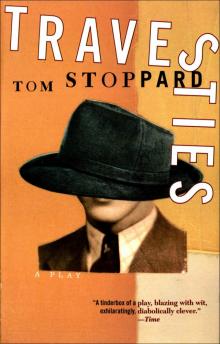 Travesties
Travesties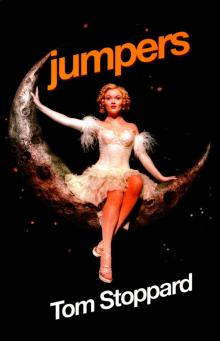 Jumpers
Jumpers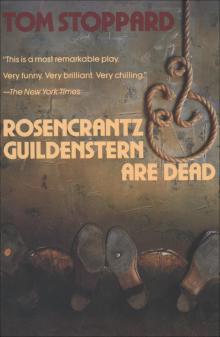 Rosencrantz and Guildenstern Are Dead
Rosencrantz and Guildenstern Are Dead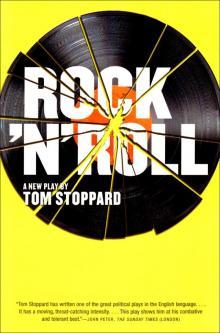 Rock 'N' Roll
Rock 'N' Roll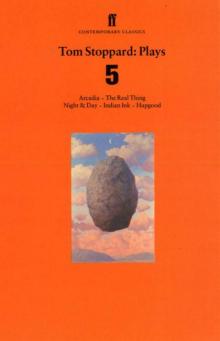 Plays 5
Plays 5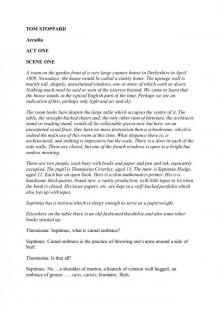 Arcadia
Arcadia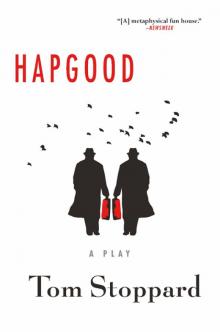 Hapgood
Hapgood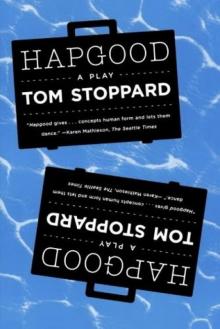 Hapgood: A Play
Hapgood: A Play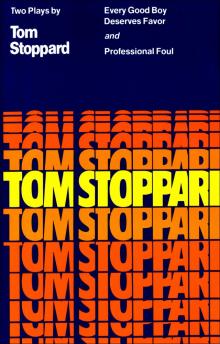 Every Good Boy Deserves Favor & Professional Foul
Every Good Boy Deserves Favor & Professional Foul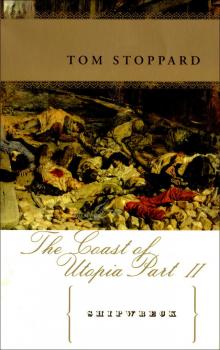 The Coast of Utopia: Voyage, Shipwreck, Salvage
The Coast of Utopia: Voyage, Shipwreck, Salvage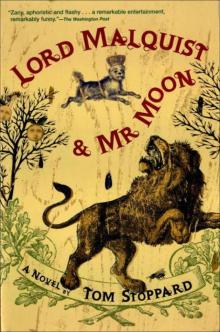 Lord Malquist & Mr. Moon
Lord Malquist & Mr. Moon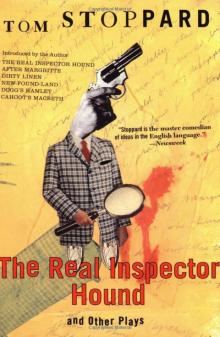 The Real Inspector Hound and Other Plays
The Real Inspector Hound and Other Plays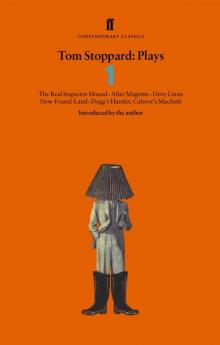 Tom Stoppard Plays 1
Tom Stoppard Plays 1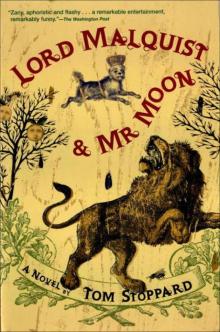 Lord Malquist & Mr. Moon: A Novel
Lord Malquist & Mr. Moon: A Novel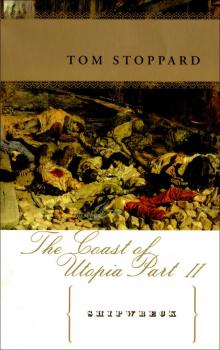 Shipwreck
Shipwreck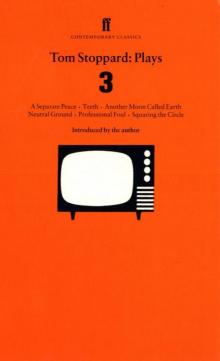 Tom Stoppard Plays 3
Tom Stoppard Plays 3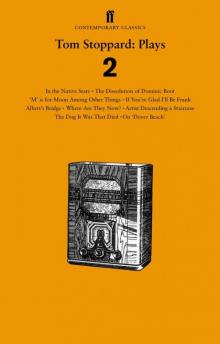 Tom Stoppard Plays 2
Tom Stoppard Plays 2 Rosencrantz and Guildenstern are dead. Arcadia
Rosencrantz and Guildenstern are dead. Arcadia